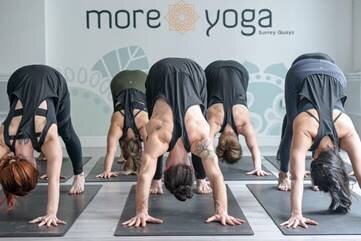According to government guidelines, Brits require, on average at least 150 minutes of exercise per week. This roughly equates to 30 minutes, five times a week.
As per NHS guidelines, it has been proven that a minimum of two yoga sessions per week counts towards this 150-minute requirement – a great result for those who prefer the low-impact, restorative nature of yoga practise to strenuous HIIT and cardio exercise.
Although yoga is a low-impact exercise, it shouldn’t be confused with low-intensity. Indeed, some forms of yoga such as Rocket, Jivamukti and Power yoga are all considered fast-paced, strength-based forms of the practise.
Ahead of National Fitness Day (26 September), MoreYoga, London’s leading yoga studio brand, has detailed why incorporating a regular yoga practise into your fitness routine is vital for increasing physical strength and mental wellbeing.
MoreYoga’s expert instructor and Head of Yoga, Becky Crepsley-Fox, gives her top five reasons why more yoga practise equals more fitness:
The Physical
Becky says, “The comment I hear the most from people who are yet to try yoga is ‘I can’t practise yoga; I am not flexible’. Sadly, these people miss the point of yoga completely.
Yoga isn’t about flexibility, although it can lend itself to increasing flexibility. As a form of exercise, it also improves athletic performance, joint mobility and of course, balance.
The physical movement required by yoga practise is also very beneficial for reducing fatigue, and increasing muscle tone, cardio health and spinal posture.”
The Mental
Becky says; “Although it seems a strange place to start for mental wellbeing, one of the key reasons yoga is good for your mind is because it stabilises the digestive system.
Hear me out – because of the sequences and flows of movement required when doing yoga, it massages internal organs into place, which in turn moves us from flight or fight (sympathetic) to rest and digest (parasympathetic).
“The deep full breaths we take in yoga help to pull us out of our adrenaline-fuelled lives and into a more relaxed present state.
For this reason, yoga works like meditation and mindfulness by reducing stress and anxiety, which in turn lowers the body’s heart rate and blood pressure.
By lowering cortisol hormones in the brain, yoga helps to reduce perceived stress.
It’s a workout which is inherently mindful, by focusing on the physical asana, keeping balance, engaging your core, breathing in sequences and focusing on flow – the mind has little time to think of anything else.”
The Spiritual
Becky says; “I have also heard a lot of people say, ‘Yoga, is that where everyone sits in a circle and chants.’
Although there are certain branches of yoga where chanting is used as a form of release, in western culture, this is a part of the practise you won’t come across as much.
Though for most, the mindfulness element of yoga does give a sense of spiritual connection to their own bodies.
For those that find this reassuring and important to good physical and mental health, there is no better form of exercise.”
The Short-Term
Becky says; “Many people have the preconception that yoga is slow and boring. Although some yoga practise is slower, such as yin yoga, there are branches that require strength and cardio fitness too.
For those looking for a dynamic class, try Rocket or Yogasana, where poses need to be held for five breaths at least – this really makes you sweat!
For those looking for a workout to strengthen arms and abs, a Jivamukti or Dharma class is a good place to work to.
Yoga doesn’t get easier with more regular practise, it only gets more interesting, more dynamic and more challenging as you improve.”
The Long-Term
Becky says, “Although in the short term, yoga practise lends itself to increased physical and emotional wellbeing, by continuing yoga for long-term gain, you can decrease the risk of future injuries and improve range of motion for joint pain.
Yin and restorative classes are good to help ease connective tissue between the muscles as well as to gain more overall flexibility and relaxation.
It’s important to combine these sorts of classes with the more dynamic ones to give yourself a full-body and mind lift.”
MoreYoga has over 25 studios across London with the goal of making yoga more affordable and more accessible.
It is committed to bringing elite teaching to convenient locations across the Capital, at a price that isn’t an obstacle.
The experienced instructors deliver an exceptional timetable with a variety of styles of yoga, Pilates and fitness crossovers.
